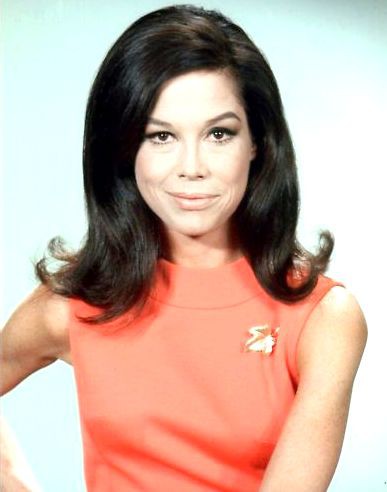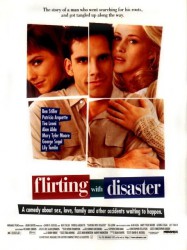Mary Tyler Moore is a Actor and Executive Producer American born on 29 december 1936 at Brooklyn (USA)

Mary Tyler Moore (born December 29, 1936) is an American actress, primarily known for her roles in television sitcoms, including The Mary Tyler Moore Show (1970–77), in which she starred as Mary Richards, a thirty-something single woman who worked as a local news producer in Minneapolis, and, earlier, The Dick Van Dyke Show (1961–66), in which she played Laura Petrie, a former dancer turned Westchester homemaker, wife and mother. Her notable film work includes 1967's Thoroughly Modern Millie and 1980's Ordinary People, in which she played a role that was very different from the television characters she had portrayed, and for which she was nominated for an Academy Award for Best Actress.
Moore has been active in charity work and various political causes, particularly the issues of animal rights and diabetes mellitus type 1. She was diagnosed with type 1 diabetes early in the run of The Mary Tyler Moore Show. She also dealt with alcoholism, which she wrote about in her first of two memoirs. In May 2011, she underwent elective brain surgery to remove a benign meningioma.
In 1955, at age 18, Moore married Richard Carleton Meeker, whom she described as "the boy next door", and within six weeks she was pregnant with her only child, Richard, Jr. (born July 3, 1956). Coincidentally, he was known as "Richie", which was also the name of her television son on The Dick Van Dyke Show. Meeker and Moore divorced in 1961. Moore married Grant Tinker, a CBS executive (later chairman of NBC), in 1962, and in 1970 they formed the television production company MTM Enterprises, which created and produced the company's first television series, The Mary Tyler Moore Show. Moore and Tinker divorced in 1981. She married Robert Levine on November 23, 1983, at the Pierre Hotel in New York City. They met when her mother was treated by him in New York City on a weekend housecall, after Moore and her mother returned from a visit to the Vatican where they had personal audience with Pope John Paul II. On October 14, 1980, at the age of 24, Moore's son Richie died of a gunshot wound, accidentally shooting himself in the head while handling a sawed-off shotgun. That model of gun was later taken off the market because of its "hair trigger".
Health
Moore was diagnosed with Type I diabetes when she was 33. In 2011, she had surgery to remove a meningioma, a benign brain tumor. In 2014 friends reported that she has heart and kidney problems and is nearly blind.
Charity work
In addition to her acting work, Moore is the International Chairman of JDRF (formerly the Juvenile Diabetes Research Foundation). In this role, she has used her celebrity to help raise funds and awareness of diabetes mellitus type 1.
In 2007, in honor of Moore's dedication to the Foundation, JDRF created the "Forever Moore" research initiative which will support JDRF's Academic Research and Development and JDRF's Clinical Development Program. The program works on translating basic research advances into new treatments and technologies for those living with type 1 diabetes.
A long-time animal rights activist, she has worked with Farm Sanctuary to raise awareness about the process involved in factory farming and to promote compassionate treatment of farm animals. Moore appeared as herself in 1996 on an episode of the Ellen DeGeneres sitcom Ellen. The story line of the episode included Moore honoring Ellen for trying to save a 65-year-old lobster from being eaten at a seafood restaurant. She is also a co-founder of Broadway Barks, an annual animal adopt-a-thon held in New York City. Moore and friend Bernadette Peters have worked to make a no-kill city and to encourage adopting animals from shelters.
In honor of her father, George Tyler Moore, a lifelong American Civil War enthusiast, in 1995 Moore donated funds to acquire a historic structure in Shepherdstown, West Virginia, for Shepherd College (now Shepherd University) to be used as a center for Civil War studies. The center, named the George Tyler Moore Center for the Study of the Civil War is housed in the historic Conrad Shindler House (c. 1795), which is named in honor of her great-great-great-grandfather, who owned the structure from 1815–52. Moore also contributed to the renovation of the house used as headquarters during 1861–62 by Confederate Major General Thomas J. "Stonewall" Jackson. Use of the house had been offered to Jackson by its owner, Lieutenant Colonel Lewis Tilghman Moore, commander of the 4th Virginia Infantry and a great-grandfather of Mary Tyler Moore.
Moore supports embryonic stem cell research. When President George W. Bush announced that he would veto the Senate's bill supporting the research, she said, "This is an intelligent human being with a heart, and I don't see how much longer he can deny those aspects of himself."
Politics
During the 1960s and 1970s, Moore had a reputation as a liberal or moderate liberal and endorsed President Jimmy Carter for re-election in a 1980 campaign television ad. In 2011, friend and former co-star Ed Asner claimed during an interview on the O'Reilly Factor that Moore "has become much more conservative of late." Bill O'Reilly, host of the O'Reilly Factor, has previously stated that Moore had been a viewer of his show and her political views had leaned conservative in recent years. In a Parade magazine article from March 22, 2009, Moore identified herself as a "libertarian centrist" who watches Fox News. She stated, "...when one looks at what's happened to television, there are so few shows that interest me. I do watch a lot of Fox News. I like Charles Krauthammer and Bill O'Reilly...If McCain had asked me to campaign for him, I would have." In an interview for the 2013 PBS series Pioneers of Television, Moore says that she was "recruited" to join the feminist movement of the 1970s by Gloria Steinem but did not agree with Steinem's views. Moore said she believed that women have an important role in raising children and that she did not believe in Steinem's view that "women owe it to themselves to have a career.
Source : Wikidata
Mary Tyler Moore

- Infos
- Photos
- Best films
- Family
- Characters
- Awards
Mary Tyler Moore (born December 29, 1936) is an American actress, primarily known for her roles in television sitcoms, including The Mary Tyler Moore Show (1970–77), in which she starred as Mary Richards, a thirty-something single woman who worked as a local news producer in Minneapolis, and, earlier, The Dick Van Dyke Show (1961–66), in which she played Laura Petrie, a former dancer turned Westchester homemaker, wife and mother. Her notable film work includes 1967's Thoroughly Modern Millie and 1980's Ordinary People, in which she played a role that was very different from the television characters she had portrayed, and for which she was nominated for an Academy Award for Best Actress.
Moore has been active in charity work and various political causes, particularly the issues of animal rights and diabetes mellitus type 1. She was diagnosed with type 1 diabetes early in the run of The Mary Tyler Moore Show. She also dealt with alcoholism, which she wrote about in her first of two memoirs. In May 2011, she underwent elective brain surgery to remove a benign meningioma.
Biography
FamilyIn 1955, at age 18, Moore married Richard Carleton Meeker, whom she described as "the boy next door", and within six weeks she was pregnant with her only child, Richard, Jr. (born July 3, 1956). Coincidentally, he was known as "Richie", which was also the name of her television son on The Dick Van Dyke Show. Meeker and Moore divorced in 1961. Moore married Grant Tinker, a CBS executive (later chairman of NBC), in 1962, and in 1970 they formed the television production company MTM Enterprises, which created and produced the company's first television series, The Mary Tyler Moore Show. Moore and Tinker divorced in 1981. She married Robert Levine on November 23, 1983, at the Pierre Hotel in New York City. They met when her mother was treated by him in New York City on a weekend housecall, after Moore and her mother returned from a visit to the Vatican where they had personal audience with Pope John Paul II. On October 14, 1980, at the age of 24, Moore's son Richie died of a gunshot wound, accidentally shooting himself in the head while handling a sawed-off shotgun. That model of gun was later taken off the market because of its "hair trigger".
Health
Moore was diagnosed with Type I diabetes when she was 33. In 2011, she had surgery to remove a meningioma, a benign brain tumor. In 2014 friends reported that she has heart and kidney problems and is nearly blind.
Charity work
In addition to her acting work, Moore is the International Chairman of JDRF (formerly the Juvenile Diabetes Research Foundation). In this role, she has used her celebrity to help raise funds and awareness of diabetes mellitus type 1.
In 2007, in honor of Moore's dedication to the Foundation, JDRF created the "Forever Moore" research initiative which will support JDRF's Academic Research and Development and JDRF's Clinical Development Program. The program works on translating basic research advances into new treatments and technologies for those living with type 1 diabetes.
A long-time animal rights activist, she has worked with Farm Sanctuary to raise awareness about the process involved in factory farming and to promote compassionate treatment of farm animals. Moore appeared as herself in 1996 on an episode of the Ellen DeGeneres sitcom Ellen. The story line of the episode included Moore honoring Ellen for trying to save a 65-year-old lobster from being eaten at a seafood restaurant. She is also a co-founder of Broadway Barks, an annual animal adopt-a-thon held in New York City. Moore and friend Bernadette Peters have worked to make a no-kill city and to encourage adopting animals from shelters.
In honor of her father, George Tyler Moore, a lifelong American Civil War enthusiast, in 1995 Moore donated funds to acquire a historic structure in Shepherdstown, West Virginia, for Shepherd College (now Shepherd University) to be used as a center for Civil War studies. The center, named the George Tyler Moore Center for the Study of the Civil War is housed in the historic Conrad Shindler House (c. 1795), which is named in honor of her great-great-great-grandfather, who owned the structure from 1815–52. Moore also contributed to the renovation of the house used as headquarters during 1861–62 by Confederate Major General Thomas J. "Stonewall" Jackson. Use of the house had been offered to Jackson by its owner, Lieutenant Colonel Lewis Tilghman Moore, commander of the 4th Virginia Infantry and a great-grandfather of Mary Tyler Moore.
Moore supports embryonic stem cell research. When President George W. Bush announced that he would veto the Senate's bill supporting the research, she said, "This is an intelligent human being with a heart, and I don't see how much longer he can deny those aspects of himself."
Politics
During the 1960s and 1970s, Moore had a reputation as a liberal or moderate liberal and endorsed President Jimmy Carter for re-election in a 1980 campaign television ad. In 2011, friend and former co-star Ed Asner claimed during an interview on the O'Reilly Factor that Moore "has become much more conservative of late." Bill O'Reilly, host of the O'Reilly Factor, has previously stated that Moore had been a viewer of his show and her political views had leaned conservative in recent years. In a Parade magazine article from March 22, 2009, Moore identified herself as a "libertarian centrist" who watches Fox News. She stated, "...when one looks at what's happened to television, there are so few shows that interest me. I do watch a lot of Fox News. I like Charles Krauthammer and Bill O'Reilly...If McCain had asked me to campaign for him, I would have." In an interview for the 2013 PBS series Pioneers of Television, Moore says that she was "recruited" to join the feminist movement of the 1970s by Gloria Steinem but did not agree with Steinem's views. Moore said she believed that women have an important role in raising children and that she did not believe in Steinem's view that "women owe it to themselves to have a career.
Best films
Usually with
Filmography of Mary Tyler Moore (23 films)
Actress

Henchmen (2021)
Directed by Chris Renaud, Pierre Coffin
Origin USA
Genres Comedy, Adventure, Animation
Actors James Marsden, Thomas Middleditch, Rosario Dawson, Alfred Molina, Nathan Fillion, Jane Krakowski
Roles Additional Voices (voice)
Rating51%





A fallen henchman named Hank, leads a team of Lester and two others, called "Union of Evil," who must prevent Baron Blackout from taking over the world, and save his love interest. The crew are assigned to the Vault of Villainy, where Lester steals the ultimate weapon accidentally.

Battle of the Sexes (2017)
, 2h1Directed by Jonathan Dayton, Valerie Faris
Origin USA
Genres Drama, Biography, Comedy, Comedy-drama, Historical
Themes Feminist films, Politique, Films about sexuality, Sports films, Political films, Children's films, LGBT-related film, Lesbian-related films, Tennis films
Actors Emma Stone, Steve Carell, Andrea Riseborough, Sarah Silverman, Alan Cumming, Elisabeth Shue
Roles Mary Richards
Rating67%





En 1973, la joueuse Billie Jean King, âgée de 29 ans, est classée numéro 1 mondiale. Refusant de recevoir à peine 10 % de la prime versée aux joueurs masculins, alors que les finales féminines attirent autant de public que les finales masculines, elle décide, avec l'aide de Gladys Heldman et de quelques joueuses, de créer la Women's Tennis Association. Les joueuses sont alors exclues de la Fédération de tennis des États-Unis par Jack Kramer.

Inequality for All (2013)
Genres Documentary
Actors Dolly Parton, Tyne Daly, Lily Tomlin, Mary Tyler Moore, Candice Bergen, Jon Stewart
Roles Mary Richards (archive footage)
Rating79%





In the wake of the 2007–08 financial crisis and the rise of the Occupy movement, the issue of income inequality has gained public awareness. Over the last thirty years, before the latest recession, the U.S. economy doubled. But, according to this documentary, these gains went to a very few: the top 1% of earners now take in more than 20% of all income—three times what they did in 1970. Inequality is even more extreme at the very top. The 400 richest Americans now own more wealth than the bottom 150 million combined. While this level of inequality poses a serious risk to all Americans, regardless of income level, much of the rhetoric on this subject has been fueled by anger and resentment from a frustrated middle class who feel their birthright—the American Dream—has been taken away from them.

Moon (2009)
, 1h37Directed by Duncan Jones
Origin United-kingdom
Genres Drama, Science fiction, Thriller, Adventure
Themes Clonage, Space adventure films, Dans l'espace, Sur la Lune, Films set in the future, Space opera, Sur la Lune, Robot films
Actors Sam Rockwell, Kevin Spacey, Dominique McElligott, Kaya Scodelario, Robin Chalk, Benedict Wong
Rating77%





In 2035, Lunar Industries has made a fortune after an oil crisis by building Sarang, an automated lunar facility to mine the alternative fuel helium-3. Helium-3 is used primarily to power fusion reactors and other things that run on fusion energy.

Against the Current (2009)
, 1h38Origin USA
Genres Drama
Actors Joseph Fiennes, Pell James, Justin Kirk, Elizabeth Reaser, Martin Shakar, Mary Tyler Moore
Roles Liz' Mom
Rating60%





The film follows the story of Paul Thompson (Joseph Fiennes) who is a writer that lost his wife and child a few years back. He and his best friend, Jeff (Justin Kirk), have talked about swimming the length of the Hudson River since they were just kids. One day, Paul asks Jeff to come along with him on his trip to finally swim the whole river. Jeff agrees and brings along one of his friends, Liz (Elizabeth Reaser). Paul is determined to reach the end of the river by a certain date, August 28. Jeff and Liz have no idea the importance of the date Paul has chosen until they have already started. They realize that the date they are supposed to finish the swim is the anniversary of his family's death. Paul tells them that on that date, he is planning on killing himself. Paul's confession causes Jeff to remember a moment about five years ago when he saved Paul from committing suicide. Jeff told him that he should wait five years and if he still wanted to end his life, he would support him in it. Now, five years later, Jeff and Liz have to decide whether they should let Paul continue with his plan or try to convince him to keep living.

Blessings (2003)
Origin USA
Genres Drama
Actors Mary Tyler Moore, China Chow, Liam Waite, Kathleen Denise Quinlan, Janaya Stephens, Ralph Waite
Roles Lydia Blessing
Rating59%





Lydia Blessing (Mary Tyler Moore) is an 82-year-old heiress of wealthy background who, since the death of her husband decades earlier, has been living as a bitter and reclusive widow at her mansion called 'Blessings'. Meanwhile, a man named Skip Cuddy (Liam Waite) has just been released on parole from county jail following an armed robbery gone wrong, only to find his girlfriend Shelley (Laura Regan) cheating on him with an old friend, Chris (Joris Jarsky). Deciding to abandon his old customs, Skip accepts an offer to work for Lydia at her mansion. Lydia's personal maid Jennifer (China Chow) is aware of Skip's mistakes in the past, and warns him not to betray Lydia, as does her daughter Meredith (Kathleen Quinlan).

Cheats (2002)
, 1h26Origin USA
Genres Comedy
Actors Martin Starr, Matthew Lawrence, Trevor Fehrman, Elden Henson, Mary Tyler Moore, Maggie Lawson
Roles Mrs. Stark
Rating59%





While other kids at the elite North Point Academy spend countless hours studying, Handsome Davis sees it as nothing more than a system of control over your mind. That's why Handsome and his three best friends Sammy, Victor and the cribsheet genius Applebee have banded together and found ways to cheat on their tests all through their school years. Everything had been going along smoothly until the gang entered their final year of high school and the stakes were upped by the school's principal, Mrs. Stark. If they get caught cheating again Stark will make a note in their permanent records and possibly kill their chances of getting into college.

Mary and Rhoda (2000)
Directed by Barnet Kellman
Genres Drama, Comedy, Romance
Actors Mary Tyler Moore, Valerie Harper, Elon Gold, Christine Ebersole, Marisa Ryan, Charlie Day
Roles Mary Richards-Cronin
Rating51%





Mary Richards-Cronin returns to New York City after spending four months in Europe following the death of her Congressman husband Steven Cronin in a rock climbing accident. Rhoda Morgenstern-Rousseau also returns to her native New York to make a fresh start as a photographer after living in Paris where she has just recently left and divorced her second husband, Jean-Pierre Rousseau.

Keys to Tulsa (1997)
, 1h53Origin USA
Genres Drama, Thriller, Crime
Actors Eric Stoltz, James Spader, Deborah Kara Unger, James Coburn, Joanna Going, Michael Rooker
Roles Cynthia Boudreau
Rating51%





The story revolves around a perpetual loser and slacker named Richter Boudreau (Eric Stoltz). Richter is from a privileged background in Tulsa, Oklahoma and works as a movie reviewer at a local newspaper only because his sour mother Cynthia (Mary Tyler Moore) pulled strings for him to land the job. He is dissatisfied with the direction that his life has taken; his girlfriend Trudy (Cameron Diaz) had just broken up with him after another disastrous date, he is about to be fired from his job because he can't meet deadlines, he lives in a dilapidated farmhouse, he uses and sells drugs behind the scenes for some extra cash, and he is so irresponsible with life in which he has gotten so far behind on his bills that his electricity has just been cut off.

How the Toys Saved Christmas (1996)
, 1h30Directed by Enzo D'Alò
Origin Italie
Genres Fantasy, Animation
Themes Films about magic and magicians, Christmas films
Actors Mary Tyler Moore, Dario Fo, Tony Randall, Walter Massey, Michael Caloz, Sonja Ball
Rating65%





When Santa's helper La Befana falls ill and must take off a Christmas Eve, she recruits Scarafoni to help deliver all the toys. No one but the toys knows is that Scarafoni plans to auction off the toys to the highest bidder, which means the toys won't make it to the children who have been good all year and deserve them. The toys decide to deliver themselves starting with a wind-up teddy bear going to the little boy's bed, and the story follows them as they struggle to avoid the heartless Scarafoni and to find their true homes. Meanwhile, a young boy named Francesco tries to find his true Christmas present - one special friend. In the end, the toys deliver themselves, but Scarafoni still has the money. However, everyone rushes to the toy shop and find Scarafoni with the money and manage to get it back from him, as Scarafoni is sent to prison. Francesco gets his true friend - a new puppy whose name is Jingles.

Directed by Bob Clark
Genres Drama
Actors Mary Tyler Moore, Allison Mack, Linda Lavin, Wayne Grace, Shirley Knight, Paul Winfield
Roles Jessica
Rating71%






Flirting with Disaster (1996)
, 1h32Directed by David O. Russell
Origin USA
Genres Comedy, Romance
Themes Films about sexuality, Transport films, Erotic films, Road movies
Actors Ben Stiller, Patricia Arquette, Téa Leoni, Mary Tyler Moore, George Segal, Alan Alda
Roles Pearl Coplin
Rating66%





Mel Coplin and his wife, Nancy, live in New York, near Mel's neurotic, Jewish, adoptive parents, Ed and Pearl Coplin. Mel and Nancy have just had their first child, and Mel won't decide on a name for their son until he can discover the identity of his biological parents. After an adoption agency employee locates his biological mother's name in a database, Mel decides to meet her personally.

The Last Best Year (1990)
, 2hDirected by John Erman
Genres Drama
Actors Mary Tyler Moore, Bernadette Peters, Brian Bedford, Carmen Mathews, Kate Reid, Kenneth Welsh
Roles Wendy Haller
Rating62%





Jane (Bernadette Peters) visits a doctor (Brian Bedford) after becoming ill during a business trip. She is told that she has a terminal illness and is referred to a psychologist, Wendy Haller (Mary Tyler Moore), to help her in dealing with the emotional aspects of the illness. Jane, although successful at business, leads a solitary life except for occasional times she spends with her married lover, Jerry, who leaves her during her crisis. Reluctant to open herself emotionally at first, she soon warms to Wendy. Jane makes a last trip to visit her beloved Aunt Lizzie (Carmen Mathews).

Just Between Friends (1986)
, 1h50Origin USA
Genres Drama, Romance
Actors Mary Tyler Moore, Ted Danson, Christine Lahti, Sam Waterston, Jane Greer, Julie Payne
Roles Holly Davis
Rating58%





Holly Davis is a wife and mother, happily married to Dr. Chip Davis, a seismologist. She isn't aware that Chip is having an affair with Sandy Dunlap, a television news reporter who interviewed him after a quake.

Finnegan Begin Again (1985)
, 1h51Directed by Joan Micklin Silver
Origin USA
Genres Drama, Comedy, Romantic comedy, Romance
Actors Mary Tyler Moore, Robert Preston, Sam Waterston, Sylvia Sidney, David Huddleston, Avery Brooks
Roles Liz DeHaan
Rating71%





Michael Finnegan, a past-his-prime journalist, has been relegated to ghost-writing Dear Felicity, a column for the lovelorn. He and his wife live in a decaying neighborhood; his wife, still despondent over losing their young son, lives in a fantasy world. Despite these reversals, Finnegan retains his optimism: he knows human beings begin again, and again. He gets his own chance to begin again when, one day on the bus, he meets Liz DeHaan, an art teacher who is having an affair with a married man.
 Connection
Connection



